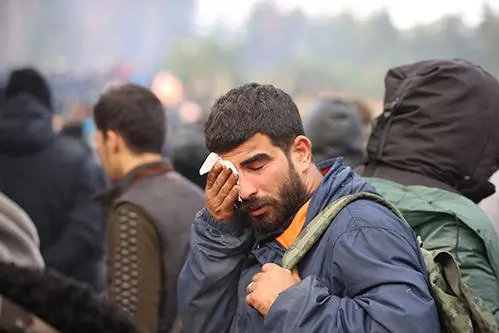PHOTO
Tensions between the EU and Belarus have risen sharply in recent weeks, with Brussels accusing the Eastern European nation of encouraging migrants from third countries to mass at the border with Poland, sparking violent clashes with Polish border guards.
Belarus has pleaded helplessness in the matter, saying that it is acting on humanitarian grounds, and denies pushing migrants westwards into the EU. Instead, it accuses Poland of using military muscle against unarmed civilians, injuring many and forcing thousands to stay for weeks in bitter cold in the open forests on the border between the two nations.
Poland admits that at least eight migrants have died on the frontier in the the past few weeks, but since it has barred journalists and human rights organizations from the area, there is no independent verification of the situation on the ground or even the number of migrants trapped around the main Polish border crossing of Kuznica.
The EU claims that Belarus has deliberately allowed migrants, mainly from the Middle East and Africa, to enter its territory in order to counter pressure from Brussels in the wake of the 2020 elections won by President Aleksandr Lukashenko. Critics and EU observers have condemned the election as fraudulent and also criticized the strong-arm leader’s violent repression of protests following the poll.
While there is some truth to the EU accusation that Belarus is allowing migrants to enter its territory, the entire crisis puts the focus back on the EU’s handling of migrants and its poor human rights record in this respect. It is also unfair to accuse Belarus of creating the crisis since it is not Belarusians who are crossing into the EU but migrants from far-off countries whose destination was always Europe. In many ways, blaming Belarus for creating the crisis would be similar to the US accusing Mexico if migrants from El Salvador, Guatemala or Honduras trooped across the border.
For the EU, the crisis revives the spectre of 2015 when over a million migrants, mostly fleeing wars in Libya, Syria, Yemen and Iraq, arrived in Europe, mainly via Turkey. Initially, Turkey, too, refused to hold them back, partly due to rising tensions with France. But, subsequently, the EU reached a deal and compensated Ankara for holding the migrants and repatriating them to their country of origin.
After the migrant influx led to an outcry in the EU and a sharp rise in anti-migrant rhetoric among the extreme right in several EU nations, Brussels tried to halt the flow at its source, for instance by helping Libya step up coast guard patrols in order to prevent migrants from leaving in boats. There have been dozens of incidents in which boats have capsized in the Mediterranean, leading to thousands of deaths. Most EU nations have been accused by human rights groups of failing to respect migrants’ human rights and causing death due to callous policies.
Indeed, the EU and the other big magnet of migration, the US, need to review their migration policies and address the problem, not in a stop-gap and crisis mode, but with a long-term view, say over at least a couple of decades. The issue of migration, which is as old as humanity, is not going to disappear just because the EU does not like it or refuses to accept it.
Migration is a result of several factors. Yes, most migrants are economic migrants, but responsibility for this lies partly with developed nations that have failed to assist developing countries reach a level of economic activity that ensures their own citizens can be gainfully employed. And, certainly, the EU and the US have been guilty of setting off conflicts and other crises that have forced more economic misery on these countries, creating the flow of migrants.
The EU also ought to recognize that migrants, on the whole, bring a lot of value to the societies where they finally settle. Thousands of examples can be cited in the US and the EU where migrants have been at the core of economic development of the host country. Moreover, almost half of EU nations are facing a severe aging crisis that needs urgent attention if their economies are not to come to a grinding halt in a few decades. The only solution for these countries is migration.
Thus, it may be time for the EU and others to review their own long-term population and economic situation and take at least a couple of steps — to create a viable migrant policy that takes care of their own needs and which also creates conditions that encourages many of the would-be migrants to stay home. Both of these need strategic and long-term thinking, as well as genuine political will, in order to be able to stand up to critics and counter the rhetoric of the far right.
Unfortunately, at least in the EU, there is hardly any leader in sight who appears to have the courage to do the right thing, by their country and by humanity.
- Ranvir S. Nayar is managing editor of Media India Group.
Copyright: Arab News © 2021 All rights reserved. Provided by SyndiGate Media Inc. (Syndigate.info).





















